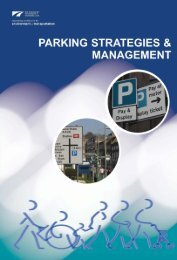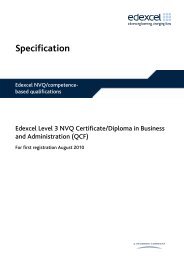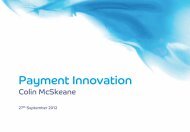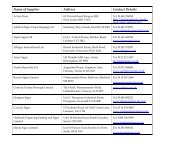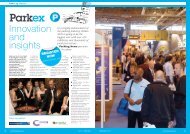Level 2 and 3 Diploma in Business Support (4475-12/13)
Level 2 and 3 Diploma in Business Support (4475-12/13)
Level 2 and 3 Diploma in Business Support (4475-12/13)
Create successful ePaper yourself
Turn your PDF publications into a flip-book with our unique Google optimized e-Paper software.
• motivation<br />
• shar<strong>in</strong>g workloads<br />
• support <strong>and</strong> advice.<br />
Outcome 3 Underst<strong>and</strong> the purpose <strong>and</strong> methods of communicat<strong>in</strong>g<br />
effectively with others <strong>in</strong> a team<br />
1. The c<strong>and</strong>idate should be able to expla<strong>in</strong> what constitutes effective communication <strong>in</strong> a team<br />
<strong>and</strong> the role it plays <strong>in</strong><br />
• sett<strong>in</strong>g <strong>and</strong> achiev<strong>in</strong>g targets/st<strong>and</strong>ards<br />
• monitor<strong>in</strong>g progress/st<strong>and</strong>ards<br />
• team cohesion<br />
• consultation/contribution<br />
• present<strong>in</strong>g <strong>in</strong>formation.<br />
2. Both formally <strong>and</strong> <strong>in</strong>formally:<br />
• written – letters, memos, reports<br />
• face-to-face – one-to-ones, meet<strong>in</strong>gs, presentations<br />
• electronically – email, telephone, video/teleconferenc<strong>in</strong>g.<br />
The c<strong>and</strong>idate should be able to select the most suitable method <strong>in</strong> terms of<br />
• purpose<br />
• formality<br />
• speed<br />
• confidentiality.<br />
3. The c<strong>and</strong>idate will need to show an awareness of different personalities <strong>and</strong> behaviours <strong>and</strong><br />
methods of encourag<strong>in</strong>g contributions <strong>and</strong> their impact on<br />
• achiev<strong>in</strong>g targets<br />
• improv<strong>in</strong>g work<strong>in</strong>g methods<br />
• team cohesion.<br />
Outcome 4 Underst<strong>and</strong> how to assess own work <strong>and</strong> the work of a team<br />
1. The c<strong>and</strong>idate should be able to describe the importance of assess<strong>in</strong>g their own <strong>and</strong> the team’s<br />
work, eg<br />
• to ensure st<strong>and</strong>ards are met<br />
• <strong>in</strong> achiev<strong>in</strong>g targets/deadl<strong>in</strong>es<br />
• to identify improvements.<br />
2. Ways of assess<strong>in</strong>g <strong>and</strong> monitor<strong>in</strong>g this, eg through<br />
• SWOT analysis<br />
• performance management systems<br />
• achievement of objectives<br />
• observation/feedback<br />
• appraisals/reviews.<br />
3. The c<strong>and</strong>idate should be able to expla<strong>in</strong> what constitutes constructive feedback, both formal<br />
<strong>and</strong> <strong>in</strong>formal, positive <strong>and</strong> negative, <strong>and</strong> the benefits to both employer <strong>and</strong> employee <strong>in</strong> terms<br />
of improvement <strong>and</strong> motivation.<br />
4. The c<strong>and</strong>idate should be able to describe the appraisal/performance review process.<br />
150 <strong>Level</strong> 2 <strong>and</strong> 3 <strong>Diploma</strong> <strong>in</strong> Bus<strong>in</strong>ess <strong>Support</strong> (<strong>4475</strong>-<strong>12</strong>/<strong>13</strong>)



